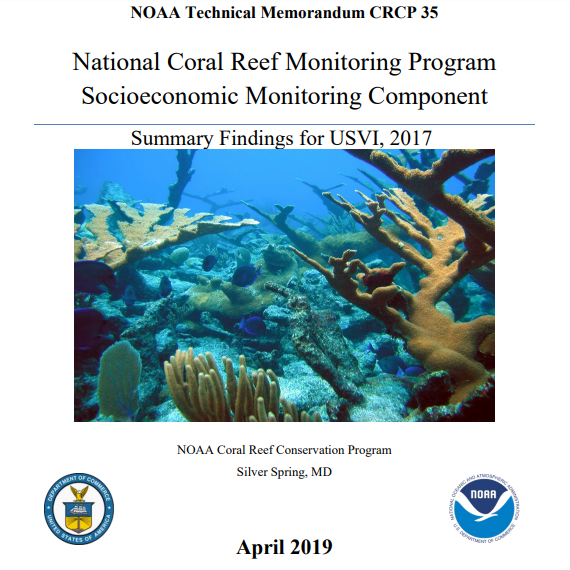
The National Coral Reef Monitoring Program (NCRMP) recently published human dimension information related to coral reef resources in the U.S. Virgin Islands (USVI). As part of its mission, NCRMP is responsible for gathering and monitoring a collection of socioeconomic indicators in the seven priority U.S. coral reef jurisdictions.
Household surveys from February to April of 2017 revealed that USVI residents generally support a range of potential marine management policies and regulations (such as size limits for harvesting fish, increased enforcement of wastewater and storm water regulations, and more restrictions on construction practices), and are mostly familiar with the various threats faced by coral reefs (such as hurricanes, pollution, and coastal development). Surveys also revealed that 79 percent of USVI residents participate in swimming, while 17 percent of residents participate in SCUBA diving and 45 percent of residents participate in snorkeling. Additionally, just over 40 percent of residents indicated that they participate in fishing or gathering of marine resources.
When examining residents’ perception of the condition of marine resources, marine debris/trash is perceived to be the most impaired, with 36 percent of residents indicating that the current condition is “bad.” Residents of different islands differ in their perceptions of marine resource condition: On average, residents of St. John have a more positive perception of marine resource condition when compared to residents of St. Thomas.
These findings represent the baseline assessment for future socioeconomic monitoring of USVI’s coral reefs, and they will feed into composite indicators that will detail the status of USVI’s coral reef adjacent communities in relation to the other U.S. coral reef jurisdictions. As this marks the completion of the first full monitoring cycle, surveys will now be repeated in each U.S. coral reef jurisdiction over the next five to seven years.
To access and download the full publication, please visit: https://www.coris.noaa.gov/activities/ncrmp_usvi_socio/.
For more information, contact Matt Gorstein or Peter Edwards.
